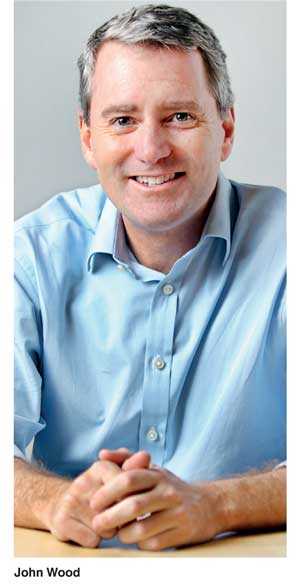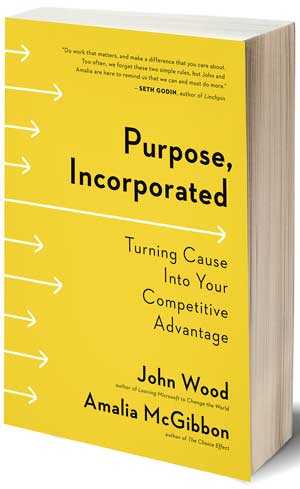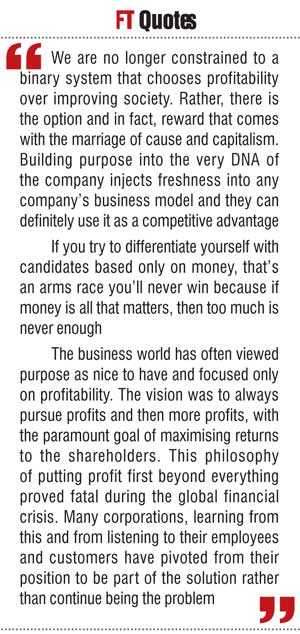Thursday Feb 19, 2026
Thursday Feb 19, 2026
Wednesday, 29 August 2018 01:00 - - {{hitsCtrl.values.hits}}

In a capitalist market economy, decision-making and investment are determined by every owner of wealth, property or production ability in financial and capital markets but its powers should and must be used for social good, insisted Founder Room to Read John Wood in an interview with Daily FT.
Wood is the author of Creating Room to Read: A Story of Hope in the Battle for Global Literacy, Leaving Microsoft to Change the World and is a four-term member of the Clinton Global Initiative’s Advisory Board. He is also a Henry Crown Fellow at the Aspen Institute. Wood was selected for the inaugural class of Young Global Leaders by the World Economic Forum and was awarded Microsoft’s first Alumni of the Year award by Bill and Melinda Gates. He is currently an Advisory Board member of Global Citizen Year.
In this interview, Wood shares insights on his newly published book purpose incorporated and how corporates and businesses could use purpose to enhance profit and profitability within an organisation.
Following are excerpts:
By Shannon Jayawardena
Q: Could you give us a small background about yourself and what your work is related to?
A: I’m John Wood, the author of three books and the Founder of Room to Read. I’ve always believed that I was a lucky winner in “the lottery of life” because I had access to books and great teachers from a young age, along with educated parents. Thanks to these lucky breaks, I’ve enjoyed a good life full of opportunities such as working at Microsoft for nearly a decade. But as I travelled the world, I noticed that millions of children had lost the lottery of life, and would have little chance to escape poverty if they did not get educated. At Room to Read, we want to change that situation, and by doing so we change the future. Through our work, Room to Read has brought the lifelong gift of education to 12.4 million children in 15 lower-income countries. And we’re very proud to have reached over a million students in Sri Lanka.

Q: Your latest book is ‘Purpose Incorporated’. What is the central theme of the book?
A: Purpose, Incorporated is a bold manifesto urging business leaders to “unite purpose with profitability,” rather than view the two as antithetical notions. I’ve profiled companies that have used purpose to build a bond with their customers, attract talented individuals, motivate employees and lower attrition rates, increase social media influence, and attract the best investors. My hope with Purpose, Incorporated is to inspire conversations among executives, boards, entrepreneurs and employees at every level of an organisation about building purpose into their organisations and careers.
Q: Can the power of capitalism be used for social good? How can purpose enhance profit and profitability within a business?
A:Yes, I believe the powers of
capitalism should be used for social good. We are no longer constrained to a binary system that chooses profitability over improving society. Rather, there is the option and in fact, reward that comes with the marriage of cause and capitalism. Building purpose into the very DNA of the company injects freshness into any company’s business model and they can

definitely use it as a competitive advantage. For example, we know that 80% of millennials are now asking, “Is this company part of the problem, or part of the solution?” during their job interviews. It’s of real benefit to be able to say, “Look, this company is really concerned about social causes and this is what we’re doing about it”.
Purpose can be used to differentiate yourself in this instance. If you try to differentiate yourself with candidates based only on money, that’s an arms race you’ll never win because if money is all that matters, then “too much is never enough”. Also it’s not just millennials. Purpose is a great way to win the war for talent among people in their 40s and 50s, too. I call these the mid-career switchers. They’re people who’ve had a great deal of success in their careers, and they find themselves saying, “Is this it? Is this all there is?” There are more and more people in this situation now. They’re too young to retire, they’ve got enough of a nest egg to take a risk, and they don’t just want to go grind out at yet another business that only makes rich people richer. Maybe that’s because at a certain point we all begin to ask ourselves whether we will leave behind a legacy when we leave this earth.
Q: How can one use his or her job to change the world?
A: As with corporations, living a purpose-filled life is the crucial first step to changing the world. You don’t have to quit your job to change the world. You need to find values you hold dear. What are you passionate about? What is your higher purpose? What is the area that you know for sure you can help? Education? Consider volunteering in your local school or library. Support a local organisation near you that is doing great work. Introduce them to your wider social circle. Involve your friends and family.
Make it a communal effort. For example, some companies attach a social outcome with every purchase. The skin-care Company Tatcha, for example, built into their business model that every time they sold a product, they would fund one day of education for one girl through the Room to Read Girls Education program. They started small, but as the business grew, so did their impact. To date, the company has now supported 1.5 million girl days of schooling, and is on track to increase that to two million. Another example is Citibank. During a 4-8 week period during quarter four every year, they tell their clients that if they trade foreign exchange on the electronic Velocity platform, each trade will result in a micro-contribution to six education organisations. Like Tatcha, it started small, but has now raised $22 million to support education. In both cases above, the companies have done well for themselves, while also doing good for the world. There are dozens of examples like this in my book, based upon interviews with founders and executives.

Q: In your book you also state that the business world got another black eye from the global financial crisis, could you elaborate a little more on that?
A: The business world has often viewed purpose as nice to have and focused only on profitability. The vision was to always pursue profits and then more profits, with the paramount goal of maximising returns to the shareholders. This philosophy of putting profit first beyond everything proved fatal during the global financial crisis. Many corporations, learning from this and from listening to their employees and customers have pivoted from their position to be part of the solution rather than continue being the problem. They have learned braving massive negative PR, paying record fines, legal bills and loss of customers that there can be a substantial cost to having their sole focus be on profit. They’ve understood that their customers will reward them if they bridge the void between capitalism and cause with products and services that promote widely shared values that improve the quality of life for a society.
Q: You have also said that many leaders have bought into false dichotomy, how can this be prevented?
A: The first step is to understand that purpose and profitability can coexist. Another is to study the market and see what other corporations and organisations are doing. Are they contributing to creating value? Are they being part of the solution or just adding more problems? They should listen to what their customers and employees are saying, do a deeper introspection about where they can create positive change and then jumpstart their initiative. Another important step is to remember that each and every one also gets a vote, we get to decide what we want our careers and our lives to stand for. I believe that each of us was not put on earth simply to make money, and that we have a higher calling. We noticed this in particular as Room to Read began to work in the former war zones of Sri Lanka, where we wanted to help deliver a “peace dividend” by bringing education to those communities. So many companies around the world lined up to help us. When I asked them why, many executives told me that this was not just a business issue for them. One executive in my home city of Hong Kong told me: “This is simply the right thing to do, and it makes me feel like my career and life stand for something bigger than just yesterday’s measures of success.”
Q: How can cause and capitalism co-exist?
A: The business world has traditionally followed the “Four P’s of marketing”: Price, Product, Promotion and Place. I’m proposing a fifth P, that of Purpose. Purpose can be used as a competitive advantage for business and now is the time, because not enough companies have realised this, so what is on offer here has substantial first mover advantage. The business world needs bold leaders who’ll follow through their promise of injecting purpose in their day to day activities. They should be guided by purpose and not just profitability alone. It makes perfect business sense when you think about it. Today’s customers and consumers make socially conscious decisions about everything. They want to support corporations that they can respect, who they know is thinking beyond racking profits for their shareholders. Having a solid purpose built into your corporate culture can attract those kind of customers and investors. It’s a win-win situation for both, really.